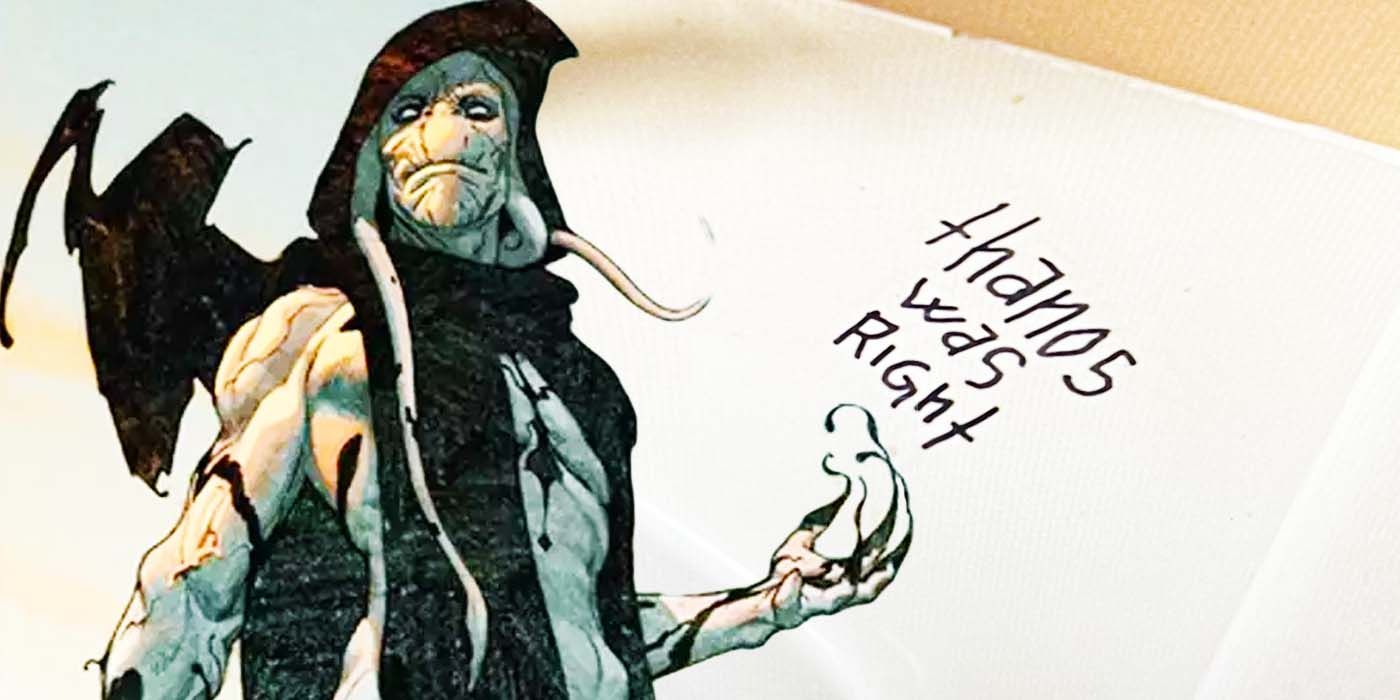
Marvel has confirmed that the Thor: Love and Thunder villain will be Gorr the God Butcher, and this villain can justify Hawkeye’s “Thanos Was Right” more than Avengers: Infinity War and Avengers: Endgame did. Despite the fact that Thanos died twice in Avengers: Endgame, his actions and ideology have continued to hang over the MCU as it has entered Phase 4. Even when new Marvel movies and Disney+ TV shows don’t directly deal with the fallout from Thanos and the Blip, they still regularly discuss the way that he affected the universe.
In Avengers: Infinity War, the long-teased Thanos finally appeared to be the villain that would put an end to the MCU’s Phase 3. He explained that his plan to use the Infinity Stones to kill half of all life in the universe was based on his homeworld of Titan where resource scarcity eventually caused the population to die out in an unpleasant way. Many viewers questioned the logic behind this choice and suggested that Thanos might reasonably spend his time more productively working to generate more resources and ensuring a more equitable sharing of those resources. Nonetheless, the Avengers were able to reverse the worse of Thanos’ actions. However, in Hawkeye, it is revealed that there are a sizeable group of people who tout the line “Thanos Was Right,” and those who felt that life during the Blip was better were set up in The Falcon and The Winter Soldier.
While Thanos’ Avengers: Infinity War argument has been picked apart by viewers and the humans in The Falcon and The Winter Soldier and Hawkeye who support “Thanos Was Right” don’t present a strong case, Thor: Love and Thunder can fix this. In the comics, Gorr the God Butcher (Christian Bale) derives his hatred of gods from the fact that he was born on a planet with almost no resources where everybody lived every day on the brink of starvation. Gorr’s whole family perished because of the lack of resources and the fact that no gods ever came to help. However, Thanos’ actions would have helped people exactly like Gorr the God Butcher, populations who were starving and ignored by larger powers. Arriving in the MCU after the Blip, Gorr the God Butcher has an emotional backstory and could easily have come to idolize Thanos and his dream.

This connection between Gorr the God Butcher and Thanos’ ideal can also help to explain why he is appearing as a villain and targeting Thor now in Thor: Love and Thunder. In the comics, Gorr learns that the gods really exist but have been ignoring him when he finds two of them fighting. However, in the MCU, his story can be motivated by the return of his planet’s population that would have once more cast them into scarcity and learning that gods like Thor exist through the grapevine in the aftermath of Avengers: Endgame. This would also explain why he specifically targets Thor in Thor: Love and Thunder as Thor was the one to actually kill the Thanos that appeared in Avengers: Infinity War.
Ultimately, the exact location of Thor: Love and Thunder’s events in the MCU timeline might not actually have a huge effect on Gorr the God Butcher’s storyline. While having the villain’s origin tied to Thanos would make a lot of sense for the wider MCU and would pay off Thanos’ Avengers: Infinity War explanation, in the comics Gorr is not strictly limited by time. After killing the Gods of Time, Gorr is able to move throughout the timestream and plots to kill all gods in all times. Loki’s introduction of the TVA might give a shortcut for this, or Moon Knight’s god Khonshu, a time god, could help to set up Gorr the God Butcher’s plans for Thor: Love and Thunder.
Comments
Post a Comment